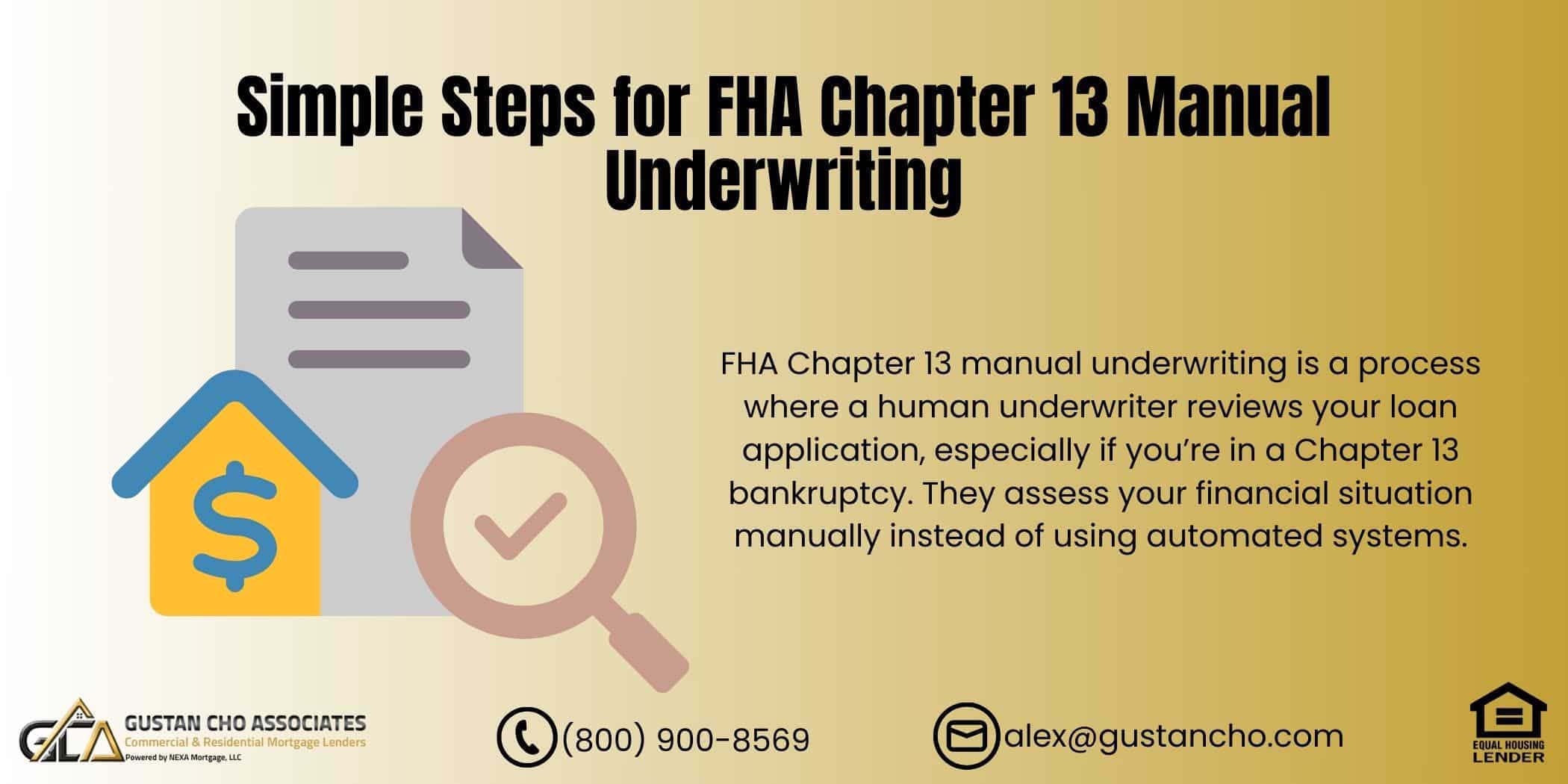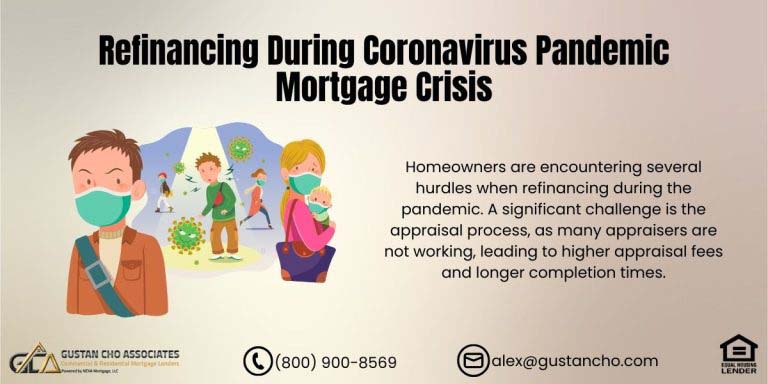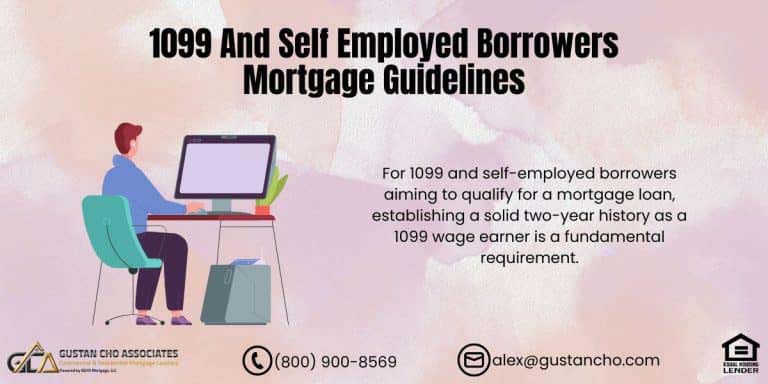Today, our blog post will explore the FHA Chapter 13 Manual Underwriting Guidelines in detail. If you’re in the middle of a Chapter 13 bankruptcy or have been out of one for less than two years, this is for you. We want to make sure you’re armed with the most up-to-date and understandable information out there. Navigating the road to securing an FHA loan can be tough with financial challenges, but understanding these guidelines will make the journey easier. We’re here to break down the FHA Chapter 13 manual underwriting process in simple, everyday language that everyone can follow.
What is Manual Underwriting?
Manual underwriting is a hands-on loan approval process. Manual underwriting is used when automated systems cannot approve a borrower. This could be due to complex financial circumstances, such as being in a Chapter 13 bankruptcy. Unlike automated underwriting, manual underwriting involves a thorough review by a human underwriter. The underwriter assesses the borrower’s financial picture. This method is more tailored and allows for a thorough review of your financial history and current situation.
FHA Manual Underwriting After Chapter 13 Bankruptcy? We’re Here to Help!
Reach out now to find out how we can help you qualify through manual underwriting and get the home loan you need.
Can You Get an FHA Mortgage While in Chapter 13?
You are eligible for an FHA mortgage in Chapter 13 Bankruptcy one year after the filing date. The same rule applies to rate and term refinances. You can also qualify for a Cash-Out Refinance FHA loan to buy out the Chapter 13 Bankruptcy early during the repayment plan. You must wait two years from your discharge date before qualifying for a regular mortgage after a Chapter 13 Bankruptcy. The good news is you can still utilize an FHA or VA mortgage to purchase or refinance a property before that two-year mark.
What is Chapter 13 Bankruptcy?
Chapter 13 bankruptcy helps individuals with regular incomes adjust their debts. The U.S. Courts’ Administrative Office manages this process. It allows you to maintain your property and pay your debts back over time. This is usually over a three—to five-year repayment period. Chapter 13 will reschedule secured debts and extend the payments. Protecting you from direct contact with creditors. This policy was implemented to help struggling Americans get back on their feet.
FHA Chapter 13 Manual Underwriting Guidelines During Repayment Plan
Once you’ve started your Chapter 13 repayment plan, it’s important to know that you need to make 12 monthly payments. You must make these payments to your trustee without missing any. This part of your payment history is super important because if you skip any payments, it could mean you won’t be able to get an FHA mortgage.
So, if you’ve been diligent and made those 12 payments on time, you’re in a good position to move forward.
Now, it’s time to consider applying for an FHA mortgage. Remember, applying under these circumstances falls under FHA Chapter 13 manual underwriting. It’s a specific process since you’re in the middle of a Chapter 13 repayment plan. But making those 12 consecutive payments shows lenders you’re serious and reliable, which helps your case.
How to Apply for an FHA Loan While in Chapter 13 Bankruptcy
- Initial Consultation: Contact a mortgage expert like Alex Carlucci at (800) 900-8569. Have a one-on-one consultation to thoroughly discuss your qualifications.
- Documentation Submission: Gather and submit the necessary documents:
- Chapter 13 Paperwork
- Last 60 Days Bank Statements – to source the down payment
- Last 30 Days Pay Stubs
- Last Two Years W2’s
- Last Two Years Tax Returns – not always required
- Driver’s License
- Underwriter Review: When you apply for a loan, the person checking your application will closely examine your finances. They will check your payments especially if you’re working through a Chapter 13 repayment plan. They’re really interested in seeing if you’ve been responsible with your money overall. This is part of the FHA Chapter 13 manual underwriting process.
- Trustee Approval: Obtain permission from your bankruptcy trustee to enter into a new mortgage. Your bankruptcy attorney and the trustee will grant or deny your ability to enter a new mortgage. Nine times out of ten, they will approve you for the FHA mortgage.
- Loan Decision: Receive the final decision on your loan application.
FHA Loans During and After Chapter 13 Bankruptcy
When dealing with an FHA loan during or after a Chapter 13 bankruptcy, getting qualified involves some extra steps. Your home loan officer will assess your circumstances according to the FHA Chapter 13 manual underwriting criteria. This means they’ll figure out the highest loan payment you can handle. Before you can move ahead, you’ll need to get a green light from your bankruptcy trustee.
This might seem odd since you’re in the middle of bankruptcy, but the trustee actually wants to help you improve your financial situation. Owning a home, instead of throwing money away on rent, can help build your wealth over time.
If your new mortgage payment doesn’t drastically increase your monthly expenses (a situation known as payment shock), your trustee will likely approve the mortgage transaction. It’s a step that can lead you to a better financial future, even as you work through bankruptcy.
Chapter 13 Buy-Out with an FHA Cash-Out Refinance Mortgage
It’s essential to know that you’ll still need to get the green light from your trustee before diving into a new mortgage deal. The money you get from this must first go towards settling things with your trustee completely. Especially if you’re eyeing a cash-out refinance. If you’re looking to wrap up your payment plan sooner by paying it off in advance, keep in mind that doing so might open the door for some creditors to come knocking, wanting more money from you.
Chatting with your bankruptcy lawyer is important to understand how these things work. Often, those revolving creditors, are the ones who might reevaluate for more money if you decide to pay off your Chapter 13 bankruptcy ahead of schedule.
Understanding how refinancing options may differ under FHA Chapter 13 manual underwriting is also key. When it’s just about adjusting your current mortgage terms to decrease your monthly outlay, your trustee usually won’t make too much fuss and will likely approve. However, if the new mortgage plan means your payments will go up, you must show convincingly that you can handle the higher payments without straining your finances. This is crucial because messing this part up could lead to more headaches. Or worse, result in your bankruptcy case getting a second look.
In short, when refinancing under FHA Chapter 13 manual underwriting, the key is to stay in close contact with your bankruptcy attorney. They’ll help guide you through the dos and don’ts, ensuring that the steps you take toward refinancing actually help move you forward and not backward into more financial turmoil.
Manual Underwriting Guidelines on FHA Loans
If borrowers do not receive approval from the automated underwriting system (AUS) but get a referral from the AUS, they may qualify for manual underwriting. However, they need to meet the manual underwriting guidelines. To qualify for an FHA manual underwriting loan, the following key points need to be met:
FHA Manual Underwriting Key Points:
- All payments in the past 24 months need to be made in a timely manner.
- Verification of rent is necessary for all manual underwriting processes.
- Borrowers in a Chapter 13 Bankruptcy need to have their FHA loans underwritten via manual underwriting.
- If a borrower has recently undergone Chapter 13 bankruptcy and the discharge has not been finalized for at least 24 months, the file must undergo a manual underwriting process.
- Do not let the term manual underwrite scare you. We are experts in FHA Chapter 13 manual underwriting. Our reviews speak for themselves.
FHA Chapter 13 Manual Underwriting Guidelines on Late Payments
Here are a few items to keep an eye out for:
- Must be on time for all housing payments for the past 12 months and no more than two 30-day late payments in the past 24 months.
- If you are not paying rent, a rent-free letter may be utilized.
- No major derogatory missed payments on revolving credit cards.
- At most, one 90-day late or three 60-day late payments are allowed.
- Must have one month of cash reserves after closing costs.
- Debt-to-income thresholds are based on compensating factors.
- A detailed letter of explanation will be required for any derogatory credit events.
FHA Manual Underwriting After Chapter 13 Bankruptcy? Let Us Guide You Through the Process!
Contact us today to get started on your FHA loan application and move toward homeownership.
HUD Reserve Requirements on FHA Chapter 13 Manual Underwriting
HUD requires reserves on manual underwriting. Reserves on FHA manually underwritten loans must be the borrower’s funds. Reserve funds on manual underwrites cannot be gifted. You cannot use seller concession or lender credit to meet FHA Chapter 13 manual underwriting reserve requirements. FHA Chapter 13 manual underwriting requires one month of principal, interest, taxes, and insurance for one to two-unit homes. On three to four-unit multi-family homes, FHA Chapter 13 manual underwriting reserve requiremenats are three months of reserves, which means three months of PITI.
Best FHA Mortgage Lenders for FHA Chapter 13 Manual Underwriting
If you are in a Chapter 13 bankruptcy and looking to purchase or refinance a house, please reach out today. We are the experts in FHA manual underwriting. While most banks do not participate in manual underwriting, our staff is experienced and knows how to get your loan to the finish line. For any questions or specifics on your loan scenario, please call Alex Carlucci at (800) 900-8569 or email gcho@gustancho.com.
We are available seven days a week, including holidays. We do all we can to take the stress out of the mortgage process. If you have a difficult manual underwriting, we can utilize our TBD UNDERWRITING PROCESS.
We look forward to your call.
Real-Life Example of FHA Chapter 13 Manual Underwriting Success
Case Study: Mark Allen
Mark Allen, who was going through Chapter 13 bankruptcy, managed to get an FHA loan thanks to manual underwriting. By consistently making his payments on time and keeping close coordination with his trustee, Mark secured a mortgage for a home, significantly boosting his financial health.
His story shines a light on the critical importance of making timely payments, being well-prepared, and the need to work alongside mortgage professionals with a wealth of experience, especially regarding FHA Chapter 13 manual underwriting. His story underlines how vital it is for borrowers to stay committed and well-informed throughout the loan process.
Conclusion
Getting an FHA loan during or after Chapter 13 bankruptcy can be difficult, but it is achievable with the right guidance and preparation. It’s important to understand the FHA Chapter 13 manual underwriting guidelines and work with experienced professionals. This will help you navigate the complex process effectively. If you have any questions or need assistance, please don’t hesitate to contact us. We are here to help you every step of the way.
FAQs: Simple Steps for FHA Chapter 13 Manual Underwriting
- 1. What is FHA Chapter 13 Manual Underwriting? FHA Chapter 13 manual underwriting is a process where a human underwriter reviews your loan application, especially if you’re in a Chapter 13 bankruptcy. They assess your financial situation manually instead of using automated systems.
- 2. Can I get an FHA loan during Chapter 13 bankruptcy? After making 12 consecutive on-time payments, it is achievable to fulfill the criteria for an FHA loan while undergoing Chapter 13 bankruptcy. This information is outlined in the manual underwriting guidelines for FHA Chapter 13.
- 3. How long after Chapter 13 bankruptcy can I get an FHA mortgage? If you’ve made on-time payments, you can apply for an FHA mortgage one year after filing for Chapter 13 bankruptcy. However, regular FHA loans are available two years after discharge.
- 4. What documents do I need for FHA Chapter 13 manual underwriting? You’ll need Chapter 13 paperwork, bank statements, pay stubs, W2s, tax returns, and a driver’s license.
- 5. Do I need trustee approval for an FHA loan during Chapter 13 bankruptcy? Yes, you need permission from your bankruptcy trustee to apply for an FHA loan during Chapter 13 bankruptcy.
- 6. What are the payment requirements for FHA Chapter 13 manual underwriting? To qualify for FHA Chapter 13 manual underwriting, you must have a record of 12 successive timely payments made to your trustee without any missed payments.
- 7. Can I refinance my mortgage during Chapter 13 bankruptcy? Yes, you can refinance with an FHA loan, which will be processed under FHA Chapter 13 manual underwriting.
- 8. What happens if I miss a payment during Chapter 13 bankruptcy? You must pay to ensure you get an FHA loan during Chapter 13 bankruptcy under manual underwriting guidelines.
- 9. What is a manual underwrite? A manual underwrite is a detailed review of your loan application by a human underwriter. It is necessary when automated systems can’t approve your loan, especially under FHA Chapter 13 manual underwriting.
- 10. Who can help with FHA Chapter 13 manual underwriting? Experienced mortgage experts, like those at Gustan Cho Associates, can guide you through FHA Chapter 13 manual underwriting and help you secure a loan.
If you have any questions on how does FHA define family member or borrowers who need to qualify for FHA loans with a lender with no overlays on government or conforming loans, please contact us at 800-900-8569. Text us for a faster response. Or email us at alex@gustancho.com. The team at Gustan Cho Associates is available 7 days a week, on evenings, weekends, and holidays.
Need an FHA Loan After Chapter 13? Manual Underwriting May Be Your Solution!
Reach out now to discuss how we can help you qualify for an FHA loan.










